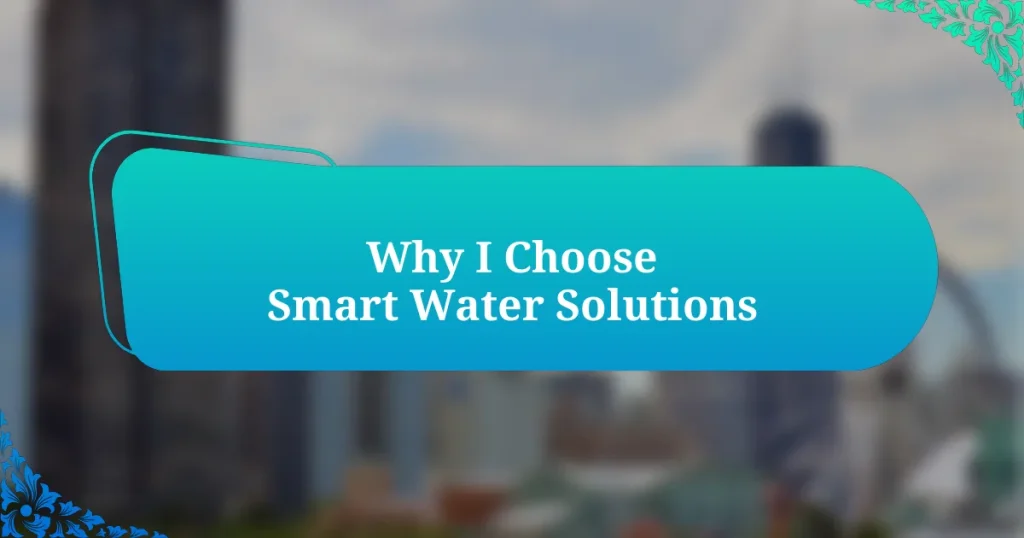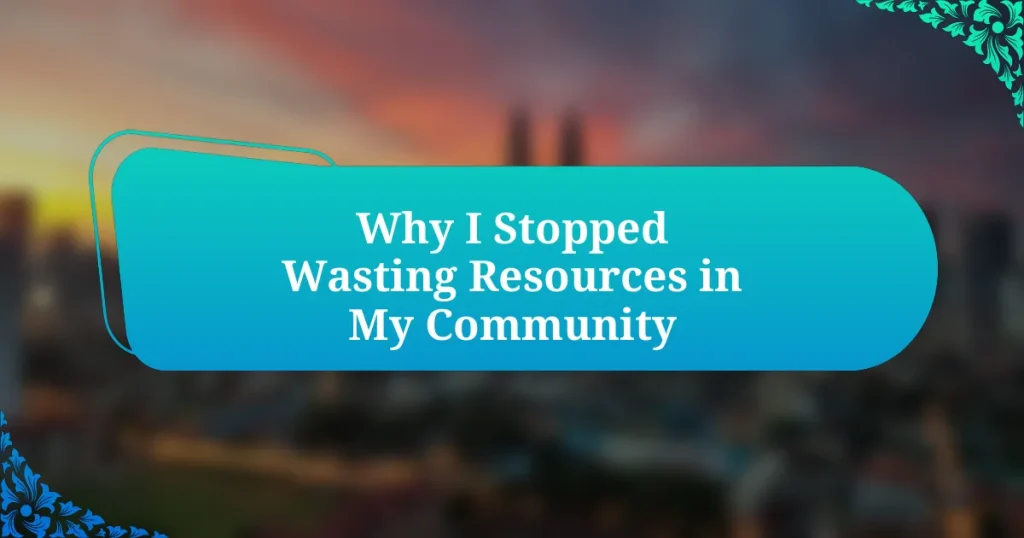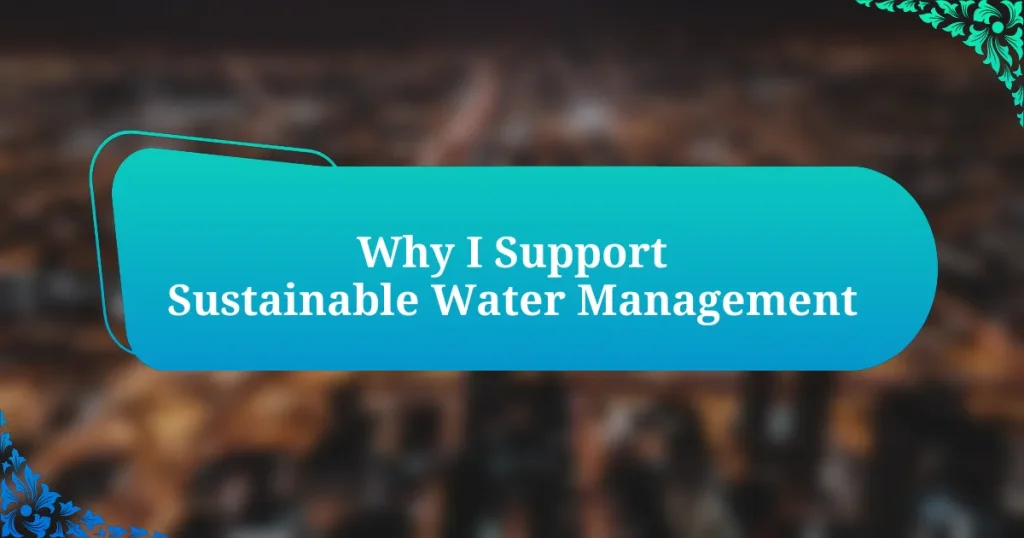Key takeaways:
- Smart City Technology enhances urban living by integrating data and digital solutions to improve sustainability and efficiency.
- Smart water solutions significantly reduce water wastage through advanced monitoring and empower communities with transparency in water usage.
- Community engagement and responsibility for water consumption increase as residents share strategies and collaborate on local initiatives.
- The future of smart water technology includes predictive sensors and AI-driven insights, fostering a culture of sustainability and enhancing community involvement.
Author: Clara Whitfield
Bio: Clara Whitfield is an acclaimed contemporary author known for her poignant storytelling and evocative prose. With a background in psychology, she intricately weaves themes of human emotion and personal growth into her narratives. Clara’s debut novel, The Echoes of Yesterday, received critical acclaim and garnered her a loyal readership. When she’s not writing, Clara enjoys exploring nature and visiting local coffee shops, where she often draws inspiration for her next story. She currently resides in Portland, Oregon, with her two rescue dogs.
What is Smart City Technology
Smart City Technology refers to the innovative integration of information and communication technologies to enhance urban living. This means using data and digital solutions to improve everything from transportation to energy efficiency. I remember my first experience with a smart traffic management system; it was fascinating to witness real-time traffic adjustments based on actual conditions, reducing congestion significantly.
At its core, Smart City Technology aims to create more sustainable, efficient, and livable environments for citizens. It’s not just about shiny gadgets or modern infrastructure; it’s about using technology to address real challenges we face in urban areas. Have you ever wondered how an optimized waste collection system could lead to cleaner streets and greater civic pride?
Moreover, this technology fosters greater community engagement by making public services more accessible and transparent. When I participated in a local forum discussing smart initiatives, it was eye-opening to see how residents’ feedback could shape a city’s technological infrastructure. This not only empowered citizens but also helped create a sense of shared responsibility for the urban ecosystem.
Benefits of Smart Water Solutions
Smart water solutions offer a myriad of benefits that make a real difference in urban environments. One of the standout advantages is the significant reduction in water wastage, a problem I’ve observed first-hand in cities grappling with leaks and inefficiencies. By using advanced sensors and real-time monitoring, municipalities can detect leaks almost instantly, leading to faster repairs and, ultimately, a more sustainable use of our precious water resources.
Additionally, these solutions empower communities by providing them with transparent data regarding water usage patterns. Imagine being able to see exactly how much water your household consumes in real-time; it fosters a culture of conservation that many don’t even realize is possible. I remember when my neighbor started tracking their water consumption and was shocked to learn of leaks in their irrigation system, prompting immediate action and saving them money in the long run.
Finally, the environmental benefits cannot be overlooked. Smart water systems often integrate with other smart city technologies, contributing to better overall resource management. As I’ve experienced in collaborative city planning meetings, this integrated approach not only enhances efficiency but also amplifies the city’s resilience against climate change. When you think about it, every drop saved speaks volumes about our commitment to a sustainable future.
How Smart Water Affects Communities
Smart water solutions profoundly impact communities by fostering a sense of accountability among residents. I recall attending a community meeting where neighbors excitedly shared their water-saving strategies, inspired by real-time data from their smart meters. It was heartwarming to see how technology not only informed us but also brought us together, united in the pursuit of a common goal: responsible water consumption.
Enhanced water quality is another crucial way smart water technologies benefit communities. I remember a local initiative where residents organized regular clean-up events, only to discover through smart monitoring that pollution levels in our water supply were declining. It was a powerful moment; we couldn’t help but feel a surge of pride knowing our collective efforts were making a tangible difference.
Furthermore, the economic impact of smart water solutions cannot be ignored. By improving water efficiency, cities can redirect funds that would have otherwise gone to emergency repairs or managing water shortages. This shift allows for crucial investments in education and infrastructure. Reflecting on this, it becomes clear how interconnected our water systems are to the overall vitality of our communities. How could we not support solutions that enhance our quality of life?
Future of Smart Water Technology
As I look towards the future of smart water technology, I envision a landscape where innovation drives conservation to unprecedented levels. Imagine a city where sensors integrated into the water supply predict leaks and inefficiencies before they happen. This proactive approach not only saves resources but also fosters a culture of sustainability—a goal that resonates deeply with my values.
Moreover, the application of artificial intelligence in managing water systems is something I find fascinating. I remember reading about a pilot project in a nearby city where AI pinpointed usage patterns, allowing for personalized alerts to households about their consumption. It struck me how empowering it is to receive tailored feedback, enabling us to make informed choices about our water usage. Isn’t it amazing to think that, as individuals, we can impact larger conservation efforts through our daily decisions?
I also see a promising trend in community engagement enhanced by smart water solutions. Consider how mobile apps are being developed to not only monitor water quality in real-time but also to encourage local residents to report issues directly. Engaging in this way creates a sense of ownership and involvement, flooding me with optimism about our collective ability to foster clean water initiatives. How often do we experience this kind of collaboration in addressing one of our most vital resources?














